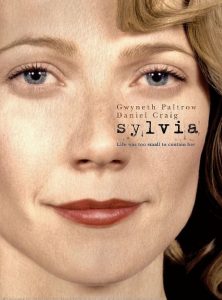Directed by Christine Jeffs
Written by John Brownlow
With
– Gwyneth Paltrowas Sylvia Plath
– Daniel Craig as Ted Hughes
– Jared Harris as Al Alvarez
Matt doesn’t think much of Ginsberg, either…
As a rule, I avoid films about insufferable poets, largely because I am reluctant to pay good money to spend time with the sort of people I can meet for free any day of the week. You know the type — the deluded, the self-involved, the pretentious; the sort of person who clings to an artistic worldview yet is unaware of their striking lack of talent. I would not say that Sylvia Plath is completely without talent, but I would classify her as just the type that gives me immediate and incurable hives. Still, while I know of Plath and have read some of her poetry, I am not familiar with her life story, except of course the famous suicide, which Woody Allen dismissed so well in Annie Hall as being “misinterpreted as romantic by the college girl mentality.” Like her comrade-in-narcissistic-arms Virginia Woolf, Plath chose to leave this mortal coil in as melodramatic fashion as possible; so as to ensure discussions of said death into eternity. And here we are, still discussing Miss Plath, not at all concerned with anything she might have said, either through poetry or in daily conversation. Plath is famous for being famous, and it took a gas oven to secure her legend.
But what about the movie? As presented (and again, I’m taking this from the perspective of someone who knew little about Plath’s daily life), Plath is morbid, crippled by jealousy, competitive, and from all accounts, not one bit talented. We hear little of her work here, so all that remains is the tail end of a painful screed against her father. I remember reading that poem in college and am familiar with its raw emotion, but it might have helped to hear it in its entirety, rather than a final line and a friend’s fawning approval. I can hear characters remark on a poet’s brilliance all day long, but I also need to see it proven; it is not enough to take it on faith. With little poetry to guide us, we are left with Plath’s tortured relationship with husband Ted Hughes, a master poet in his own right who also happens to be as unfaithful as they come. But let us consider this for a moment. Plath is presented as somewhat unbalanced, pushed over the edge by a cheating husband. Given what even the most isolated philistine knows about art and poetry, does it not stand to reason that poets are the most likely individuals to stray from marriage? The only shocker is that a poet even committed to marriage in the first place, as being a poet is all about experience, self-indulgence, and unchecked hedonism. Hell, it’s part of the contract one is issued when one announces poetry as a career. After you finish this review, spend a few moments thinking and come up with the name of a poet who was any of the following: sane, pleasant, faithful, stable, or sober. If any of you can come up with just one name to violate these tenets of a poetic life, you will be rewarded far beyond your expectations. This central truth is why Sylvia is so maddening. It is simply too much to believe that anyone with the alleged talent of Plath could be so blind regarding matters of the heart. If she had the ability to translate her pain to the page, why didn’t she see that it would only be a matter of hours before Teddy was exchanging fluids with yet another wide-eyed student?
The film is certainly well made, serious, and well acted. Paltrow always manages to inhabit her characters and Sylvia Plath is no exception. But I could not forget that this was a biography; an attempt to portray a woman’s life through dramatic means. None of the creative process is discussed, nor are the inspirations for art. Instead, we watch Plath try to get published, ruin a dinner because of a jealous rage, watch her husband find more success, have a few kids, and then kill herself after Ted reveals he has gotten another woman pregnant. Sounds like fun, eh? Still, and you might find this shocking, I did not hate Sylvia. Plath herself bored me to tears, but the movie kept me as involved as one could expect. Because I knew where everything was heading, a sad inevitability permeated the proceedings, but knowing how one’s life turns out should not make a movie less than stellar. It is the journey to that end that matters, and on that note I can’t say I cared more than I didn’t. Plath was the sort of woman who communicated with poetry so as to avoid real human contact (this comes across best in the early scenes with Ted) and perhaps it was this barrier to human feeling that sealed her doom. Despite her flair with words and honesty with a pen, perhaps in the end she never fully understood herself at all.
Special Ruthless Ratings:
- Number of times I have wished I could write poetry: 4
- Number of times this wish has been motivated by the desire to score with hot slutty college chicks: 4
- Number of poems by Plath I have read in my life: 1
- Number of poems by Plath I will read as a result of watching this film: 0
- Number of times I wondered how Paltrow could do highbrow stuff like this and lowbrow shit like Shallow Hal and View from the Top and sex with Ben Affleck: 2
- Number of times I admitted to myself that I enjoyed those two films more: 5
